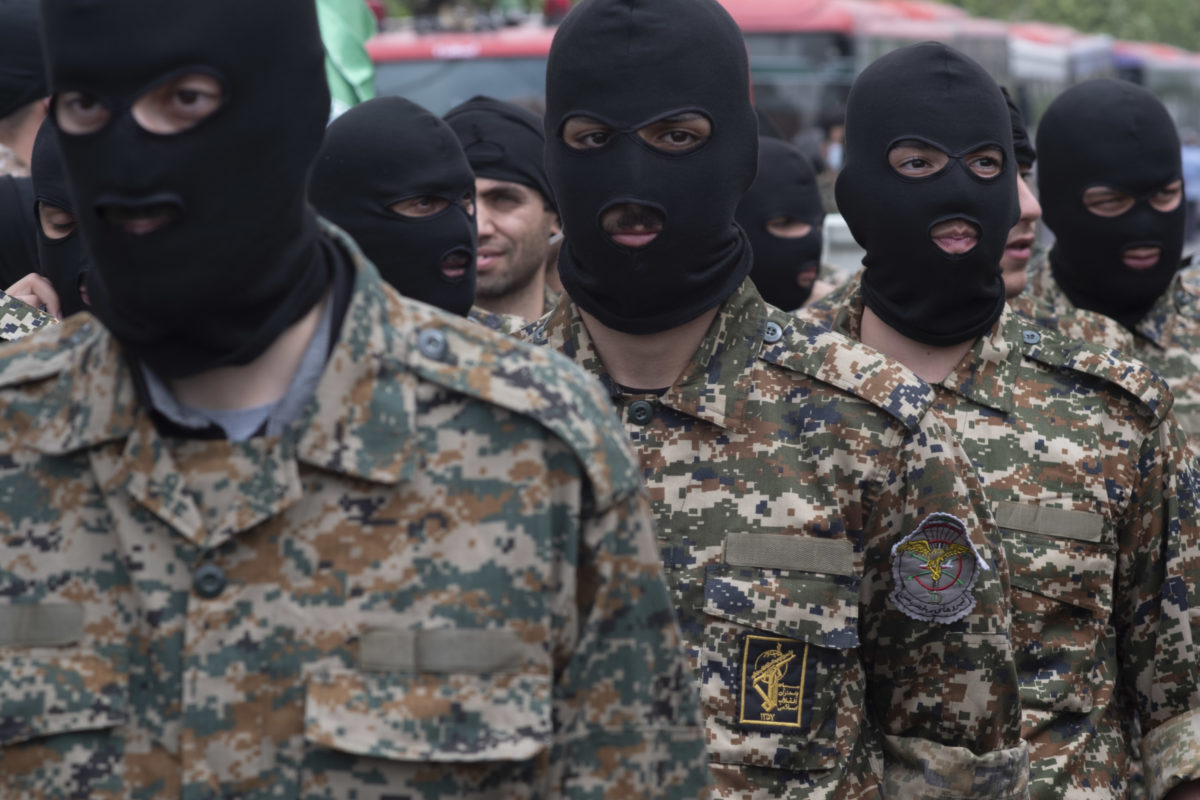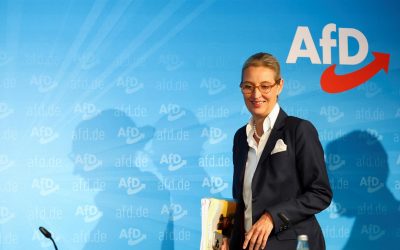German Efforts to Designate IRGC as Terrorist
Iranian Protests Put Berlin, Brussels to Test
Majalla – Germany is still betting on its relations with Iran despite criticism from parliament and the government. It hopes to obtain a number of economic investments for its companies in Iran with any expected decision to lift sanctions, which is linked to discussions on the Iranian nuclear issue. The German position on Iran’s policies of suppressing demonstrators puts Berlin and Brussels to the test of whether Germany really does put the issue of human rights ahead of its economic interests. This is still a subject of speculation.Germany condemned the Iranian authorities’ violence against the protesters, stressing that it is considering with Brussels to include the Revolutionary Guards on the terrorist list, which would be a move Tehran described as “irresponsible.”
Meanwhile, Iran has charged a thousand people in the protests taking place in the country.Why did the European Union not condemn Iran’s politicians for the suppression of the demonstrators? Is the European Union contemplating a ban on the Iranian Revolutionary Guard Corps (IRGC) to deter Iran?On October 31, 2022, German Foreign Minister Annalena Baerbock said that Germany and the European Union are considering adding the Iranian Revolutionary Guards to the list of terrorist organizations. Germany has announced that it will impose tougher sanctions on Iran outside the EU sanctions package. “We are also studying how we can designate the Revolutionary Guards as a terrorist organization,” Baerbock added.
Since the killing of the Kurdish girl Mahsa Amini by the morality police last September, Iran has witnessed protests which constitute one of the boldest challenges facing the rulers of Tehran since 1979. Iran described criticism of its handling of popular protests as “interfering” in its “internal affairs” and criticized Germany’s plans to list Iran’s Revolutionary Guards as a terrorist entity. Foreign Ministry spokesman Nasser Kanaani said that the Revolutionary Guards is an official military organization of the Islamic Republic, and that it would be considered a “completely illegal act.”
About IRGC
The Iranian Revolutionary Guard is a paramilitary militia body that was formed during the “Islamic Revolution” of 1979. It maintains its air, land and sea branches and protects the Iranian regime. Its special operations unit, the Quds Force, has helped create proxy militias in Iraq, Syria, and Lebanon. In defiance of a United Nations Security Council resolution, the Iranian Revolutionary Guard launched a second satellite early this year 2022 to monitor from space and show that Iran has the technology to achieve an intercontinental ballistic missile capability. Will the Iranian Revolutionary Guards be designated?
Brussels is studying whether the Iranian Revolutionary Guard will be placed on the ban list, amid German criticism of Iran for its handling of the demonstrations. “I have made it clear that we will launch another package of sanctions, and that we will discuss how to list the Revolutionary Guards as a terrorist organization,” Baerbock told ARD. These statements came a few days after the German Foreign Minister issued a statement pledging to rearrange relations with Iran.”There can be no ‘business as usual’ in our bilateral relations with a country that treats the lives of its citizens with such contempt,” she said in the statement.
“I have used the past few weeks to make extensive efforts to critically review the remaining instruments in trade and finance, including commercial relations that still exist with Iranian banks. Bilateral dialogue still exists, in the field of economy and energy, the same applies to German cultural institutions and teachers working in Iran – we will reduce their presence significantly.”
BERLIN SUMMONS IRANIAN AMBASSADOR
In January 2018, German police raided suspected Iranian agents who were believed to have spied on potential Israeli and Jewish terrorist targets, including Jewish kindergartens. Germany summoned Iran’s ambassador in Berlin after a Pakistani man was convicted of spying for Iran on a German politician as a possible assassination target. On October 10, 2022, Belgium accused an Iranian diplomat accredited in Austria of plotting a bomb attack in France.
KEEP THE QUDS FORCE ON THE US LIST
The United States has insisted that Iran’s Revolutionary Guards’ Quds Force remain on its designated list of terrorist groups, while Washington continues negotiations to restore the 2015 Iran nuclear deal. The Chairman of the Joint Chiefs of Staff, General Mark Milley, told a congressional hearing that in his “personal opinion” the Quds Force should not be removed from the terrorism list, which is one of Tehran’s conditions for renewing the deal. The United States Treasury Department designated the IRGC for the first time in October 2007 in accordance with counter-proliferation authorities under Executive Order 13382.
This action also designated the IRGC’s Quds Force branch—though not the IRGC in general—as a terrorist group by executive order No. 13,224 in June 2011. The State Department added the Iranian Guard to the list of foreign terrorist organizations. On top of the numerous Treasury designations mentioned above, the European Union banned economic transactions with the IRGC in 2010, and the US and EU designations remained in place after the 2015 nuclear deal was implemented.
VOLUME OF TRADE BETWEEN GERMANY AND IRAN
The volume of trade between Germany and Iran in the period from January to July 2022 amounted to 1,072 million euros, which represents a growth of 4% compared to the same period of the previous year (1,035.5 million euros). In the first seven months of 2022, Germany exported 885 million euros to Iran, an increase of 3% compared to the same period last year (856 million euros). On the other hand, Iran’s exports to Germany amounted to 187 million euros and also increased by 4% compared to the same period last year, 179 million euros.
Human Rights Situation in Iran
The human rights situation in Iran is deteriorating by the day, as security forces take increasingly brutal measures against women and men in the streets, who demand nothing more than their universal human rights. The systematic oppression of women and ethnic, religious and sexual minorities in Iran is nothing new, but it is currently reaching unprecedented levels.The situation in Iran is becoming increasingly dangerous for German citizens as well. The human rights sanctions that Germany has imposed together with its European partners can be considered a first step. Germany is now in the process of adapting its bilateral relations to the current situation with further measures.
There is a package of sanctions that the European Union could impose on Iran which would make more perpetrators of human rights violations subject to sanctions. Meanwhile, Germany is considering including officials as well while sanctions are imposed in principle at the level of the European Union.It is estimated that sanctions would include not issuing national visas in the future except to holders of official and diplomatic passports and when absolutely necessary. Additional national travel restrictions would also be imposed on members of Iranian organizations listed by the European Union.
CONCLUSION
The statements of German Foreign Minister Baerbock to put the Iranian Revolutionary Guard on the ban list could be a threat and pressure being used by Germany against Iran. This is occurring in the wake of Iran’s arrest of several people with Iranian citizenship, although it was not confirmed whether they had dual citizenship. This means that Germany can discontinue its threats, perhaps to reach an agreement with Tehran to provide consular support to German citizens at the very least if they are not released.The designation of the Iranian Revolutionary Guards could complicate the Vienna talks, as the designation of the Iranian Revolutionary Guards by the United States was one of the thorniest issues during the course of the nuclear talks. EU sanctions on the IRGC would add another obstacle to reviving the Joint Comprehensive Plan of Action (JCPOA).
Germany is more attentive to its economic interests with Iran than to both the issues of human rights and its national security.Despite the criticism directed at the German government for years, it is still betting on an agreement on the Iranian nuclear matter. Germany is still hoping to get a number of investments inside Iran with the possible lifting of sanctions against Iran.The option of placing the Iranian Revolutionary Guards on the ban list remains, but according to the current data, it is unlikely that Berlin will take this step at the present time unless there is an escalation of demonstrations inside Iran and Iran continues to suppress the demonstrators. This may apply also to the stance taken by the European Union, which can be described as a timid and traditional attitude.




